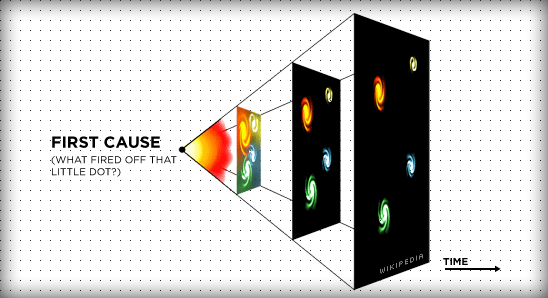Post
Computers and God
I came across an interesting presentation on digg (and surprisingly, it wasn’t a kitten with horrifying spelling/grammar) recently that compared – albeit often fallaciously – our existence and universe to a computer program.
The more prominent arguments for the existence of God, at least in the realm of philosophy of religion, posit the existence of some greater being, but it is often unclear what attributes such a being would have. Cosmological or “first-cause” arguments identify God with the supposedly necessary spark at the beginning of the universe, but it is still a leap to assign it omni-everything (omnipotent, omniscient, all-good) attributes. Similar leaps occur in other arguments (ontological, teleological, etc), where the vagueness of what this God is allow the computer analogy to take hold.

What does this all mean? If at the helm of our universe is not the traditional God, and we can only know that something exists (if that), then we have something closer to the computer program analogy where there is only a creator and its product. So, let’s push that analogy.
Cosmic Geek
At this stage, the creator does not of necessity have the omni-everything attributes of the traditional conception of God. In fact, it need not even be all-powerful, just powerful enough to provide the first cause (following the cosmological argument). Therefore, the creator’s motivations may not include attending to our universe’s condition (these cosmic geeks are notoriously irresponsible). Our universe could be one of millions of instances, or just a prototype – a flawed beta abandoned for the next revision.
Natural Laws
If our universe is analogous to a computer program, then it was likely designed according to a blueprint or archetype and is subject to laws and rules. Once a program is run or instantiated, however, it exists independently of its source though it continues to be bound by the laws according to which it was created. Similarly, if our universe is comparable to a computer program, then it’s subject to natural laws and proceeds according to a predetermined causal chain. Nothing that happens within a computer program is causally inexplicable, and while our universe may be more complex than Mail.app, it would be in principle possible to deduce that a particular event will occur if we know all of the antecedent conditions and laws.
Reaching the Creator
Is it possible for us, as objects within this application, to communicate with the creator? Here, some of the analogies seem to falter (and collapse altogether in the presentation). In a typical program, instantiated objects are necessarily restricted to accessing things in their “universe”. Direct contact is therefore not possible, however, the creator can incorporate relative metadata which could be accessible by objects in the program.
Our universe differs from a typical program in that it includes objects (such as ourselves) that are self-aware, and while we’ve decided that our universe is deterministic, we can still allow for a soft view where if we had chosen to, we could have done otherwise. So, we can choose to access this “metadata”, and since our analogy is particularly weak at this point, it doesn’t seem entirely impossible for us to reach beyond our universe and attempt to contact the creator.
What does the Universe Run On?
In a program (simplifying things a tad), variables and objects occupy bits of memory and the application runs or is interpreted by some kind of processor. In our universe, objects extend in space, but what exactly “powers” everything? This one gets quite difficult as we don’t typically conceive of our universe as dependent on some other thing, and any guesses here would be purely speculative.
Conclusion
Well, this has been a fun little thought experiment (and it’s just that, an experiment, these are not my views nor am I advocating what I’ve said as a belief system, blah blah blah), if you have more ideas for stretching out the analogy, leave them in the comments!
If you like it, digg it
Archive
-
260.
The Ethics of Practicing Procedures on the Nearly Dead
The report from the field was not promising by any stretch, extensive trauma, and perhaps most importantly unknown “downtime” (referencing the period where the patient received no basic care like...
-
260.
The Ethics of Teaching Hospitals
I can’t imagine what the patient was thinking. Seeing my trembling hands approaching the lacerations on his face with a sharp needle. I tried to reassure him that I knew what I was doing, but the...
-
260.
Conscious Conversation: Behavioral Science
Dr. Eran Zaidel is a professor of Behavioral Neuroscience and faculty member at the Brain Research Institute at UCLA. His work focuses on hemispheric specialization and interhemispheric interaction...
-
260.
Progress Report
Two years down, I’m still going. The next two years are my clinical rotations, the actual hands-on training. It’s a scary prospect, responsibilities and such; but it’s equally exciting, after...
-
260.
Why Medical School Should Be Free
There’s a lot of really great doctors out there, but unfortunately, there’s also some bad ones. That’s a problem we don’t need to have, and I think it’s caused by some problems with the...
-
260.
The Cerebellum: a model for learning in the brain
I know, it’s been a while. Busy is no excuse though, as it is becoming clear that writing for erraticwisdom was an important part of exercising certain parts of my brain that I have neglected...
-
260.
Conscious Conversation: Philosophy
Daniel Black, author of Erectlocution, was kind enough to chat with me one day and we had a great discussion – have a listen.
-
260.
The Stuff in Between
I’m actually almost normal when not agonizing over robot production details, and quite a bit has happened since I last wrote an update. First, I’ve finally graduated. I had a bit of a...



Comments
Of course, the causal antecedents fly in the face of quantum mechanics. Now, there’s a whole different philosophy of everything!
Hamilton
Mar 3, 06:57 AM #
God exists, nuff said
Sulcalibur
Mar 3, 08:52 AM #
Thought-provoking article.
The most interesting non-traditional conception of God I’ve come across is Tipler’s Omega point theory. I don’t know physics well enough to examine his math and understand everything well enough to know if he’s right, but the implications of that theory are pretty interesting to think about.
Since computational resources within the Omega point are unlimited, creating a simulated universe would be trivial. And anybody within the simulation could simulate his own universe. And so on, ad infinitum.
Everything that could conceivably exist could be simulated. For example, one could make a world without shrimp. Or, one could simulate a world consisting of nothing but shrimp.
Woah.
Chris Papadopoulos
Mar 3, 09:29 AM #
Nice post
Interesting ;)
Antonio
Mar 13, 04:44 PM #
Reminds me of this presentation and its treatment of desire and free will. :)
Incidentally, there is a new theory in circulation that posits the universe may not have begun with a Big Bang, but a Big Bounce. (The collapse of another universe may have given rise to ours.) Fascinating stuff.
What happened before the Big Bang?
Echoes from Before the Big Bang May Be Inaudible
A Cyclic Universe
QD
Mar 16, 04:11 PM #
God does not exist in the traditional sense. No one set the universe into existence. Instead, it was started as the result of the death of the previous universe. That previous universe was started by the death of the universe before that and so on. I find it much more comfortable to believe in Infinity rather than an omnipotent god.
baki
Mar 18, 12:24 PM #
God exist as the ultimate creator of everything. A computer exist by itself is impossible and the universe therefore is created by an ultimate force.We can call the force as an existence itself instead of God.Time and space is created and hence there are night and day,living and dying,hot and cold and ecetera.A computer software and the fate of the universe is a good metaphor because we ourselves can create our own software or destiny.
hilda
Mar 29, 02:23 PM #
if u can answer how big is space, we may find answer to ur analogy.
DrSuresh T
Mar 31, 10:06 PM #
Wow, that is very close to what I believe in. I think both atheists and followers of religions have too many flaws in their belief systems. You simply can not explain how this amazing universe can come from nothing. (I wish there were a stronger, more proper word to explain what I think about the universe, amazing does not give it justice). At the same time, the same thing why I rule out the possibility of something coming from nothing without being triggered (my brain) makes it impossible for me to believe in the fairy tales religions are full of.
I believe a creator started all this. A someone or a something. He/she/it does not need to be just, loving, omnipotent, or anything else religions say he/she/it is. The universe can be easier to comprehend when thinking of a complex program. It is amazing in complexity for us, but nobody needs to maintain it. It was set and left as is. It has a life span and it will expire one day.
Beyond that I simply do not know. Neither does anyone we have a record of. It is simply beyond our brain power to understand it. And I admit, it makes me frustrated. Oh well, I hope it is just a teenage thing (though I honestly doubt that).
Have a good day everybody and sorry about my English. I am not a native speaker.
(PS: VERY nice site. I was checking design inspiration sites and I found this out. Awesome work).
Mody
Apr 1, 04:47 PM #
the problem here is that if we are suggesting there is some start point of everything, then why does it have to be a creator?
at the start point, something has to come from nothing. if this is some kind of god, then they can create the universe. however, it is not necessary that it is a creator, because if we acknowledge that something must come from nothing, why not the big bang and universe itself.
alternatively, we have to agree that there was no start point and that there has always been something. Again, this could be a creator, or the universe itself.
Either way, whether we believe that the universe was created or had a start point, we cannot claim that either theory is a base proof for the existence or non existence of a creator
wroebot
Apr 11, 08:33 AM #
You simply can not explain how this amazing universe can come from nothing.
Just to clarify, atheists do not believe that the universe came from nothing. Just that there is no evidence to suggest the existence of a personal god, one which hears, cares and intervenes in the lives of humans or the machinations of the universe. Therefore they do not believe such a thing exists. Atheists have no official position as to the origin of the universe. We merely await evidence.
Thanks
robb smigielski
Apr 27, 02:18 PM #
Nice and Interesting.
brotee mukhopadhyay
Apr 29, 07:21 PM #
There is no necessary connection—only a traditional connection—between God and Creation (meaning universe-creation at a particular moment call “the Beginning.” ) “God” can mean creation (or evolution) as an ongoing universal process. “God” can also mean human moral creativity, either as the manifestation of this universal process/creativity/evolution, or as its recent fruit.
Making God originary (the First Cause) rather than emergent (caused) is what leads to all kinds of conundrums having to do with God’s power, goodness, omniscience, and so forth—mainly the well-known Problem of Evil. On the other hand, allowing God to be something comparatively new in the universe, “himself” evolved, and in some sense learning, offers liberation from scientism as well as from atheism and religious fundamentalism, this while ushering one to a renewed commitment to the ethical-spiritual life.
For versions of this line of thinking, take a look at http://www.amazon.com/God-Good-We-Do-Theopraxy/dp/0979375401/ http://www.amazon.com/Conduct-Life-Harvest-Book-Nb/dp/0156216000/ or http://www.amazon.com/Source-Human-Good-Henry-Wieman/dp/B0014RRJKM/ or http://www.amazon.com/Beginning-Creativity-Gordon-D-Kaufman/dp/0800660935/ and http://www.amazon.com/I-Thou-Martin-Buber/dp/140672730X/ and http://www.amazon.com/Letters-Young-Rainer-Maria-Rilke/dp/0486422453/
Michael B
May 8, 05:17 AM #
I rather like the Douglas Adam’s wonderful analogy on this subject –
Some rich clients – known to humans as mice, which are three-dimensional representations of hyper-intelligent pan-dimensional beings that only had representatives on Earth to monitor its progress – the Magratheans – designed Earth – not as a planet but an organic supercomputer to calculate the Question, not the Answer, to Life, the Universe and Everything.
The Answer is already known to the mice. As “Deep Thought” – their super computer told them, the Answer is 42, but this only makes sense if the Question is known.
Amit
May 12, 09:24 AM #
Please, rationally define God.
Go ahead, I’m waiting.
Still waiting.
Whenever you’re ready…
As soon as we get that matter cleared up, we can start our discussion.
Chuck Hustle
May 12, 05:10 PM #
Hmm, I guess I’m joining this conversation a little late. It appears that a few commentors are 100% sure that God exists (and probably created the universe), while others are a bit more skeptical.
I won’t weigh in on that just now, but I’d like to propose another ‘theory’ about ‘the beginning of the universe’. What if there isn’t a beginning? Stephen Hawking describes a situation where a man is walking north toward the north pole. When he crosses the northern-most point, he is now walking south.
Could this apply to the universe? Who knows. But it’s just one of severals theories that so many theists do not consider. God is just one theory, and an unproven one at that.
Ted Goas
May 20, 12:39 PM #
In Buddhism, there is no beginning or ending of universe because it happens to be like breathing in and out, expanding and crunching, on and on. Our lives also happen to occur in the repetitive karmic cycle – we born, get old, get sick, die, born again (in other life form) and on and on.
To seek the answer to the ultimate question of life, universe, and everything also does not lead to an end of our individual karmic cycle. It’s irrelevant to the essence of pursuing nirvana.
verdiinpink
Jun 29, 01:16 AM #
I have seen lots of things recently comparing our world to that of software. A lot of things conveniently fit. Its definitely fun to think about.
Bryan Chain
Jul 16, 11:34 AM #
Worth noting that we’re all atheists. It’s just that some of us don’t believe in one more God.
Christians, for example, don’t believe in Osiris (son of the Earth god Geb), an Egyptian god who created all life, one of the oldest gods for whom records have been found. Nor do they believe in the Hindu god Brahman, or the Mayan god Acat, or the Aztec god Tezcatlipoca. But ancient Egyptians or Mayans or Aztecs or modern day Hindus believe in those gods just as fervently as Christians believe in their god.
Everybody can’t be right about their god. Accident of birth, it turns out, is the best reason most people have for chosing their god.
Tailspin
Apr 19, 06:20 AM #
Add a Comment
Phrase modifiers:
_emphasis_
*strong*
__italic__
**bold**
??citation??
-
deleted text-@code@Block modifiers:
bq. Blockquote
p. Paragraph
Links:
"linktext":http://example.com